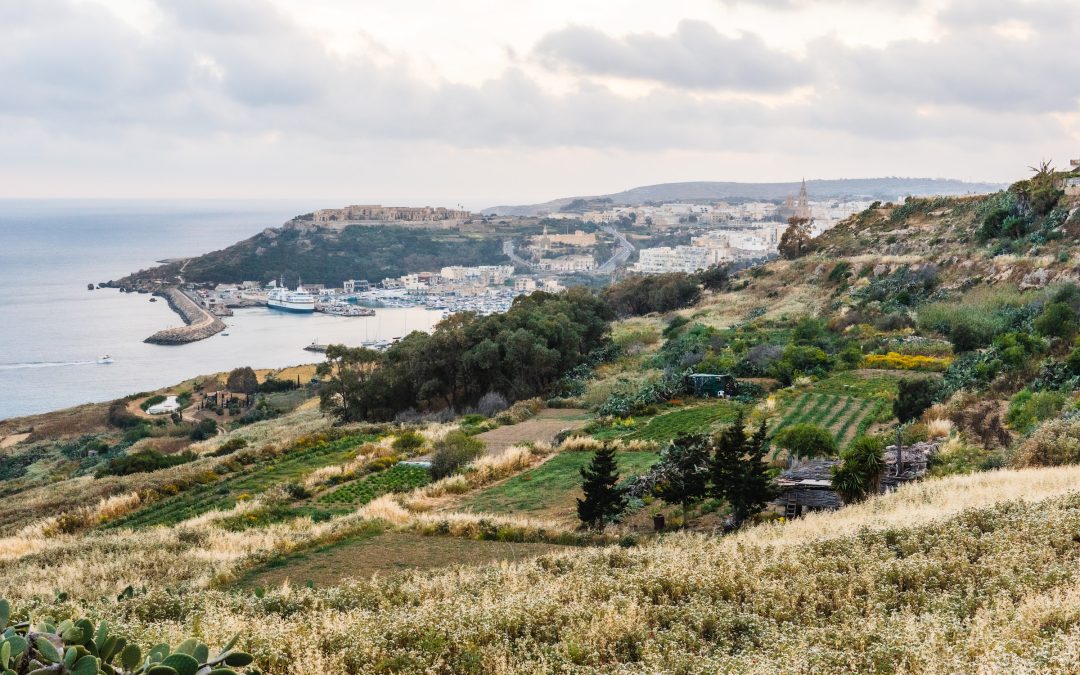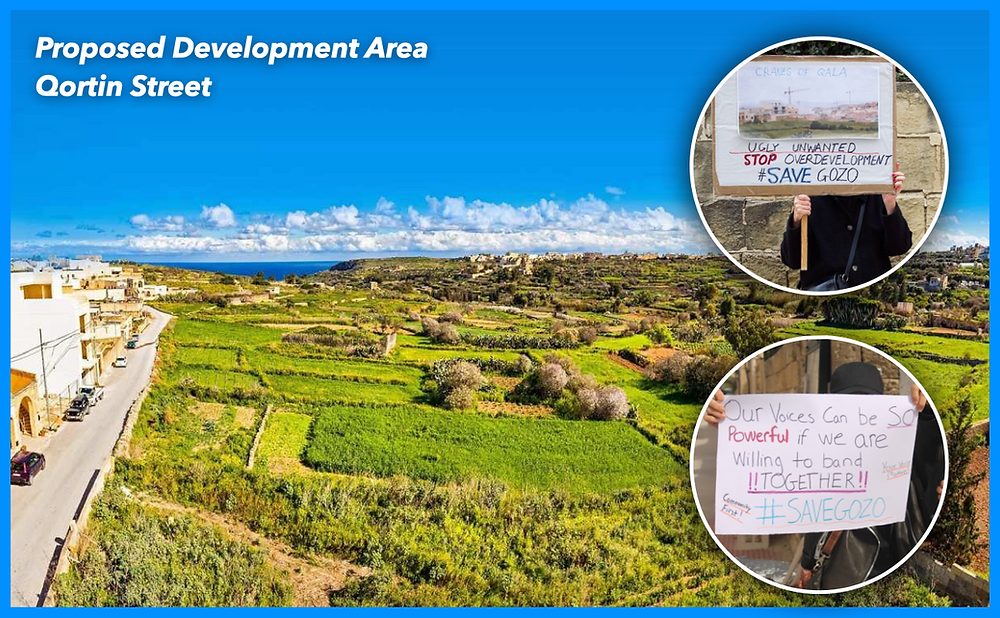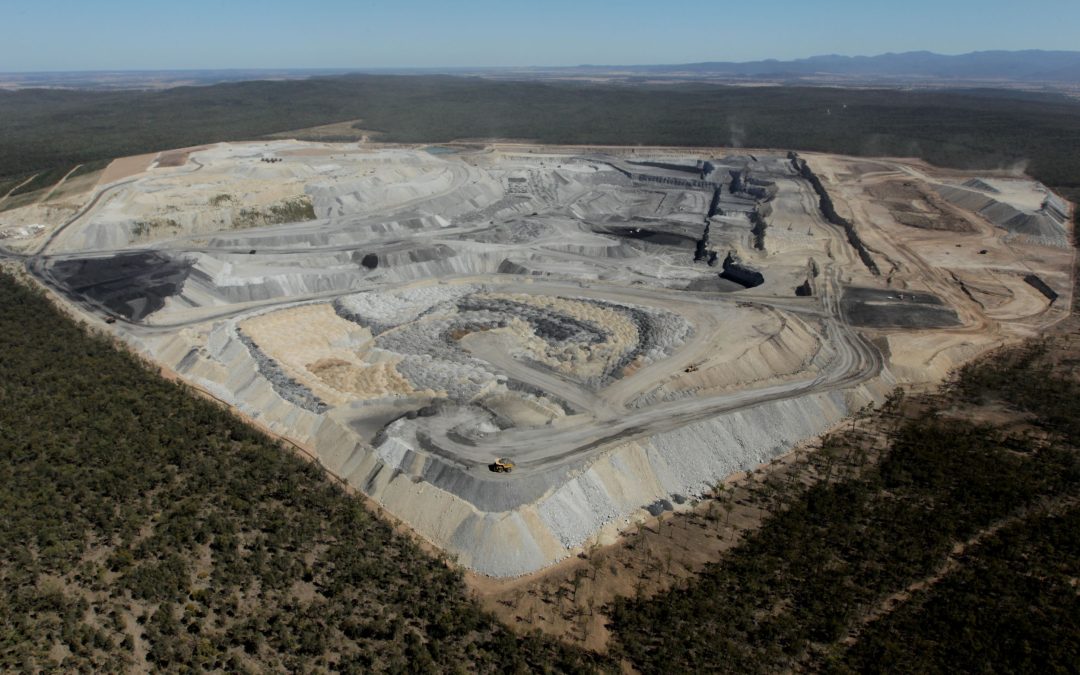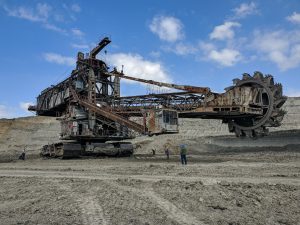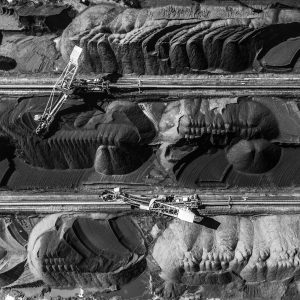With the war in Ukraine forcing Europe to seek alternatives to Russian fossil fuels, Australia is opening dozens of coal mines – and sacrificing its natural and cultural heritage in the process. Local authorities are invoking the consequences of the European war to get projects approved, despite the fact that behind the scenes it is the interests of Glencore and Adani – both based in Switzerland – that are ultimately at play.
In remote areas of Queensland, Aboriginal people and environmentalists are organising resistance to the shovel-and-dynamite lobby, but are coming under increasing pressure from mining groups.
Ochre earth gets everywhere, as gritty as those who walk on it, omnipresent in the semi-desert landscape. A pale-yellow column of smoke – up to 50 metres high – stands out against the horizon. With no high ground to cause an echo, the blast from the deep scar of the Carmichael mine rings out with a sharp bang. The mine is located in the geological basin of Galilee, in the heart of Queensland in north-eastern Australia.
Coedie MacAvoy has witnessed this scene often. Born and raised in the region, the son of an Elder of the Wangan and Jagalingou people (a guardian of wisdom), the 30-year-old introduces himself with pride. He relates the number of days he has spent occupying the small plot of land situated just in front of the Adani Group’s concession, which the company wants to transform into one of the largest coal mines in the world. On this October afternoon, the count is at 406 days – the same number of days as the camp of the Waddananggu (meaning “discussion” in the Wirdi language) has existed.
This vigil was not enough to prevent the start of production last December, but it’s a big thorn in the side of the ambitious multinational. The company is controlled by the Indian billionaire Gautam Adani, who became the third richest man in the world (net worth USD 142.4 billion) thanks to booming coal prices (see below). In April 2020, he set up a commercial branch in Geneva with the aim of offloading its coal, and registered with a local fiduciary. According to Public Eye’s sources, Adani benefitted from the support of Credit Suisse, which enabled it to raise USD 27 million in bonds in 2020. After Coal India, Adani has the largest number of planned new coal mines (60) according to the specialist platform Global Coal Mine Tracker. Glencore occupies sixth position in this ranking with 37 planned.
In Waddananggu, the ceremonial flames of those known here as “traditional owners” have been burning since 26 August 2021. They are accompanied by various people who come and go; young climate and pro-Aboriginal activists, sometimes together with their children – around 15 people in total. Those who emerge from the tents and barricades to observe the thick column of smoke that is dispersing into the distance are told: “Don’t breathe that shit in!”.
With sunburned shoulders, a feather in her felt hat covering her blond hair, Sunny films the cloud of dust moving away to the north-west, towards the surrounding crops and scattered cattle. Sunny denounces the destruction of Aboriginal artefacts that are as old as the hills, and is documenting all the blasts from this mine which – after around 15 years of legal wrangling – is expanding at top speed.
After two years of pandemic, coal mines are producing at full throttle to capitalise on historically high prices. Following the invasion of Ukraine on 24th February last year, Australian coal (the most suitable substitute for Russian coal in terms of quality) is selling at three times the average price of the past decade. Countries highly dependent on Russian fossil fuels, like Poland, have been begging Australia to increase its exports of thermal coal. In Queensland, the authorities even took advantage of the situation to support particularly unpopular projects, such as Adani’s.
Since the start of the war in Ukraine, 3.3 million tonnes of Australian coal have been exported to Europe, according to data provided to Public Eye by the specialist agency Argus Media. Close to half of these exports (1.4 million tonnes) was dispatched on 11 bulk carriers from the Abbot Point terminal, which opens onto the Coral Sea in the north-east of the country, and is also controlled by Adani.
Sunny is indignant: “They shouldn’t detonate when the wind is like this”, she says. “They shouldn’t do it at all – but even less so today!”
For Adani, the objective is to reach 10 million tonnes’ production until the end of 2022. If the group seems to be in a tearing hurry, it’s because its project was initially aiming to produce 60 million tonnes per year, transported 300 kilometres via a dual railway line to Abbot Point. This port is only a few dozen kilometres from the Great Barrier Reef: designated a UNESCO World Heritage Site since 1981, it is considered to be “endangered”, according to a report by UN experts published at the end of November 2022. From here, coal is loaded onto bulk carriers to be burned – primarily in Indian, Chinese and Korean power-plants – nearly 10,000 kilometres from there.
For Grant Howard, a former miner from the region of Mackay who spent 30 years working in the industry, the mine is an environmental and logistical aberration: “Carmichael only makes commercial sense because Adani owns all the infrastructure and makes the Indian population pay too much for energy”.
Grant became an environmentalist and withdrew to the “bush” to be closer to nature. He denounces this “anachronistic” project that is threatening to act as a Trojan Horse for other mega mining projects in the Galilee Basin, which had not been exploited until Gautam Adani’s teams arrived.
“People who continue to extract thermal coal don’t have a moral compass”, he laments.
Australia has the third-largest coal reserves in the world, enough to continue production for four centuries.
When contacted, Credit Suisse claims to be fulfilling its responsibilities in relation to climate change. “We recognise that financial flows should also be aligned with the objectives set by the Paris Agreement”, its media service states, providing assurances that, in 2021, the bank reduced its financial exposure to coal by 39 percent.
On the other hand, the spokesperson did not specify whether a client like Adani, which makes most of its revenues from coal and is planning to open new thermal coal mines, would be excluded from financing in the future. “The position of Credit Suisse in terms of sustainability is based on supporting our clients through the transition towards low-carbon business models that are resilient to climate change”, they explain.
The country’s bloody history
For Coedie MacAvoy, this is very much a personal affair. In support of the fight of his “old man” – his father Adrian Burragubba went bankrupt in legal proceedings against the multinational – he occupied the Carmichael site on his own in 2019 in order to “reclaim pieces of property” on his ancestral lands. In doing so he created a blockade against Adani’s construction teams. He survived two weeks of siege before the private security services completely cut off his supply lines.
The same man has led the rebellion since August 2021, but he is no longer alone. “I am contesting the basic right of the government to undertake a compulsory acquisition of a mining lease”, declares Coedie. With piercing green eyes, a rapper’s flow, and his totem tattooed on his torso, the rebel-looking, young man – who has an air of fight the power – is happy to continue the lineage of activists occupying the trees. “I’m not a greenie from inner Melbourne”, asserts the Aborigine.
The local Queensland government finally abolished native people’s land rights in 2019 in order to give them to the mining company, which has treated them like intruders ever since. However, following harsh opposition from Coedie and his father, they were vindicated by the courts, who gave them the right to occupy their land “to enjoy, maintain, control, protect and develop their identity and cultural heritage” provided that they don’t interfere with mining activity.
It’s a loophole in the law linked to this region’s bloody history, and to the conditions under which the land was acquired from the Aborigines. Coedie MacAvoy explains: “You know, the whites arrived in Clermont in 1860 at the time of my great-grand father. They basically shot all fighting-age males.” Aboriginal people were only included in the Australian population census in 1967. The Australian (federal) Constitution still doesn’t afford them specific rights. “We learned to wield the sword and use it to the best of our abilities. We opened Pandora’s Box”, Coedie MacAvoy maintains proudly. He kept the Irish name “borrowed” by his grandfather. Very much at ease like a tribal leader, he teaches the youngest generation Wirdi and dreams of creating an Esperanto of Aboriginal dialects, because “everything I say or do is recognised as a cultural act”. This enrages the Adani Group, which is determined to hold on to its mining concession, and frequently calls the police, though based nearly 180 kilometres away.
Public Eye witnessed how aggressive the multinational can be towards people who take an interest in its activities. During our investigation in the field, a private security services’ SUV followed us along the public road that leads to the mine, and filmed us getting out of the vehicle in front of the Waddananggu camp. Several hours later, a letter arrived by mail at Public Eye’s headquarters with an order to leave the area – “leave immediately and do not return” – and banning us from broadcasting the images filmed on site. The letter concluded by citing that a complaint had been filed with the local police and leaving no doubt as to the threat of legal proceedings.
Public Eye sent a detailed list of questions to Adani. The company did not wish to divulge any plans for its branch in Geneva or its ambitions for the development of the Carmichael mine, nor did it wish to discuss its attitude towards its critics. On the other hand, the multinational “completely” rejected our questions implying that its activities or businesses have acted in an irresponsible manner or contrary to applicable laws and regulations. “It is disappointing that Public Eye is using its privileged position as an organisation based in an extremely wealthy and developed country to seek to deprive the poorest people in the world from accessing the same reliable and affordable energy that advanced economies have been benefitting from for decades” concludes their response, sent by a spokesperson from the Australian branch of the company.
Yet, the data available to Public Eye shows that a substantial part of Adani’s coal production has been redirected towards ports in the Netherlands, Germany, Sweden and the UK. Thus, not really the “poorest people in the world”.
Big money – and heroes in hard hats
The fight led by the Coedie family against the multinational may seem unbalanced. Both the federal and Queensland governments have rolled out the red carpet for mining companies, who given the historically high prices of coal must be bringing in AUD 120 billion (CHF 76 billion) in export revenues for 400 million tonnes of thermal coal (destined for electricity production) and metallurgical coal (for industrial use).
The Zug-based multinational Glencore is the largest mining company in the country with 15 mines (representing two-thirds of its production). With its Australian, Chinese and Japanese competitors, and the aforementioned Adani, it forms a powerful network of influence that has its own friends in the media and political circles. In Queensland, the coal lobby claims to contribute AUD 58.8 billion (over CHF 37 billion) to the local economy, along with 292,000 jobs, of which 35,000 are direct.
In June 2015, the former conservative Australian prime minister Tony Abbott described the Adani project as a “poverty-busting miracle that would put Australia on the path to becoming an energy superpower”. The Indian group obtained a tax break and an opaque years-long moratorium on its royalties. Under pressure, the authorities finally refrained from awarding a loan to the multinational to enable it to develop its railway line. In 2019, a report by the Institute of Energy Economics and Financial Analysis – a think tank examining questions linked to energy markets and policies – estimated the value of these “gifts” at over CHF 2.7 billion, a sum large enough to actually make the project viable.
In 2017, the journalist and tour operator Lindsay Simpson went to the homeland of Gautam Adani in the Indian state of Gujarat with a group of Australian activists. Their mission was to disrupt the company’s General Assembly and to intercept the Prime Minister of Queensland, Annastacia Palaszczuk, who was there on an official visit. Simpson told her:
The first meeting between Lindsay Simpson and the Adani Group dates back to 2013. Having acquired the Abbot Point terminal two years earlier, the Indian company wanted to increase its capacity through spectacular works undertaken directly in the Coral Sea. To do this, it sought to persuade the tourism sector to back a plan to dump three million cubic metres of dredged sediments directly in the sea. At the time, the former crime journalist at the Sydney Morning Herald had already switched to offering sailing cruises and refused to approve a related document, produced by Adani and endorsed by the Central Tourism Association, as she held the document to be made “against compensation”.
Today, Lindsay Simpson describes herself as an author of fiction and of 11 detective novels based on real crimes, “including that of Adani”: Adani, Following Its Dirty Footsteps (2018). In the book, she relates the kowtowing of local politicians to the Australian mining industry. Drawing a parallel between the colonialisation of Australia and its history of mining, she attacks the ongoing and hypocritical “tributes” paid to these “male working-class heroes in hard hats”.
Queensland’s first coal deposits were discovered in 1825, to the west of Brisbane, at a time when the region served as a penal colony for the British Crown. The large-scale exploitation of sedimentary rock that resulted, when the region became a free territory two decades later, fuelled the steamboats despatching the first colonisers.
In the “countries”, those rural areas located in the interior of Australia, the population continues to depend on these jobs, which constitute an almost exclusive source of income, along with agriculture. In the villages of Collinsville, Clermont or Emerald – where several of Glencore’s mines are located – the obstructionism of environmentalists and of defenders of Aboriginal rights is more readily criticised than the impact of extractivism. The arrival of journalists is rarely viewed positively and few agree to speak with a media outlet “whose agenda they don’t share”.
Making a living for the kids
Luke Holmes is an exception. However, bumping into him while he was watching his herd on his quadbike, he insists on the need to create jobs: “The kids need to be able to continue to work. You won’t become a doctor here.” He spits out his chewing tobacco; his two dogs panting in the background. Luke himself spent some 15 years working for a mining company, which enabled him to put aside the funds needed to purchase enough land to live off. Entry-level salaries are easily as much as AUD 45 an hour (CHF 29), nearly double that for highly qualified workers. Food and accommodation are also provided. Even though he remains grateful to Big Coal, the farmer admits that “regulation is far more flexible for coal mines than for farmers.”
It’s indeed the Coal King who reigns in this region, barely tolerating cohabitation. According to official figures, in Australia there are currently 68 projects in the pipeline to expand or open new mines, half of which are in Queensland. Faced with the rise of coal mining, some farming families have become resigned to experiencing their second expropriation with stifled sobs. To compensate, the mining companies negotiate case-by-case compensation arrangement that are accompanied by sensational announcements highlighting the benefits for local communities and the number of jobs created. Adani had promised 1,500 jobs during the construction phase and 6,750 indirect jobs. These figures have since been revised significantly downwards.
Associate Professor in environmental engineering, Matthew Currell is concerned about the impact of the coal mines over the water resources in these semi-arid regions: “The government of Queensland awarded Adani a license to pump as much subterranean water as its wants”. Impact studies were not properly conducted, denounces the author of the column: “Australia listened to the science on coronavirus. Imagine if we did the same for coal mining”. For this researcher at the Royal Melbourne Institute of Technology (RMIT), there is a clear risk of contamination or drying out of the ecosystem of water sources of Doongmabulla, which is home to communities of rare vegetation that are sacred for the Aborigines. This danger has been ignored in the face of economic and electoral interests.
The dealer and his metaphors
There is a more worrying problem at the global level – that of fossil-fuel emissions. For a long time, the debate was focused on carbon dioxide (CO2) generated by the combustion of coal. A criticism to which lobbyists have often responded by shifting the problem to the countries where the coal is consumed.
“It’s the defence of the dealer – I’m simply selling heroine, I’m not responsible for the consumers”, maintains Peter MacCallum.
In late September, the local government also announced in a fanfare that it wanted to phase out thermal coal from domestic energy consumption by 2035. No mention was made of exporting it, however. An announcement that moved Peter MacCallum to comment ironically: “This will bring us in line with Switzerland – our hands will be clean!”
Logically, environmental opposition focuses increasingly on the problem of methane, a powerful greenhouse gas that is released at the point of extraction of fossil fuels. Eighty-two times more powerful than CO2, for a century it has been responsible for the increase of 0.5 degrees in global temperatures, according to one of the IPCC’s latest reports. In Australia – the industrialised country most vulnerable to climate disasters, as evidenced by the rise in sea levels or forest fires – the heart of environmental concern is shifting from burning coal to its extraction and processing. In this scenario, the “dealer-as-producer-country” metaphor evoked above ceases to apply.
New satellite imaging from NASA enabled the research agency Ember to produce a report in June 2022 analysing the methane leaks from all the coal mines in Australia. This was made possible by images produced by a satellite belonging to the US space agency Nasa. They found that these mines produce nearly double the amount of pollution caused by motorised traffic. This situation is set to worsen with the mining projects in the Galilee Basin, such as that of Adani, which have a life of several decades.
Among the most polluting open-cast mines is Hail Creek: in 2018, Glencore bought a majority shareholding and its approximately 7 million tonnes of production. Satellite images show that the mine leaks over 10 times the quantity of methane declared by Glencore to the regulatory authorities. Contacted several weeks in advance, the Zug-based group refused to let us visit the mine, citing “annual budget reviews” as the reason. Nonetheless, at the site entrance from the public road that leads solely to the mine and its checkpoint there is a sign that cites openness and responsibility as among Glencore’s values. When questioned, the company sent us an information sheet on the question of methane emissions. It describes the phenomenon as being linked to open-cast mines, vaunts their efforts to reduce leaks (by burning the gas or capturing it to convert it into electricity) and raises doubts as to the use of satellite imagery “of a discontinuous nature” when compared against their annual emissions declarations.
In Queensland, it’s nevertheless becoming hard to ignore climate change. The Great Barrier Reef, which is the region’s pride and joy and extends over 2000 kilometres, is being ravaged by increasingly violent cyclones and an acceleration of the phenomenon of coral-bleaching. According to a government report, in May 2022 a prolonged heatwave affected 91 percent of the reef. This was the fourth heatwave since 2016. The tourism industry is usually tight lipped on the subject, to avoid discouraging budding divers and sailors. However, tongues are starting to wag.
Born in California, Tony Fontes arrived on the shores of Airlie Beach in 1979 “to live his dream of diving on the reef”. He has never left. However, the Great Barrier Reef has suffered so much that today the experience is not the same as it used to be. “It’s an omerta. Instead of uniting to counter the interests of mining companies that harm tourism, operators prefer to deny the consequences of climate change out of fear that the tourists won’t come back anymore”, he denounces. For her part, Lindsay Simpson has observed the arrival of a new phenomenon that she calls disaster tourism; namely, visitors rushing to see the Great Barrier Reef before it’s too late.
The industry’s halcyon days
Yet the coal industry still has a big future. In April 2020, between the areas of Capella and Emerald, Glencore submitted permit applications for the construction of what could become the largest mine in Australia – six coal shafts producing 20 million tonnes a year. Codename: Valeria Project. Start of work in 2024, with a duration of 30 months – with the accompanying rail and electricity infrastructure. The contract is valid for 37 years, or until well after 2050, the date at which the Zug-based group committed to becoming “net zero” in terms of its greenhouse-gas emissions.
In February 2019, under pressure from its investors, the multinational – then managed by Ivan Glasenberg – committed to limiting its coal production to 150 million tonnes per year. In 2021, a year still impacted by the pandemic, it produced 103.3 million tonnes. Since then, Glencore has not hesitated to acquire its competitors’ shares in the Colombian Cerrejón mine, which will add 14 million tonnes to its own production.
Within the approximately 10,000 hectares that Valeria will occupy in the area, Glencore has already largely marked out its territory. Nine families have already been evicted and the site, on which there are two state forests, has been almost entirely fenced off. The only remaining inhabitant is a helicopter pilot living in a small house, who is waiting for his lease to expire in January 2023.
In the newsagent in Capella, which also serves as an information centre, the shop assistant hands visitors a brochure produced by Glencore, dated May 2022. It summarises the timetable of operations. “It has been going for many years. It does not come as a surprise”, she relates with an air of resignation. “We have many mines around. We know what this is about.”
One farmer, who did not wish to be named, is not pleased to be sitting “in the dust of Glencore”. In Australia, mines are emptying the countryside. Largely because the group does not have a terrific record in terms of relations with its neighbours, according to the farmer. His property shares a border of many kilometres with the future Valeria mine. Even though he has no desire to leave “this land that gave us so much and is part of us”, the inconvenience resulting from the extraction of coal will force him to.”
“People in Switzerland should realise just how invasive the mining industry is”, he says gravely.
On Aboriginal land
Scott Franks is in total agreement with this. When he opposed Glencore’s expansion project at its Glendell mine, located on the lands of his Wonnarua ancestors, the Aborigine found himself named and targeted (along with another activist) in a full page published in a local media outlet. It presented him as “seeking to stop the project” and any industrial activity over a surface area of 156km2 in the Hunter Valley in New South Wales, putting 3000 jobs at stake. “The strategy is to turn the mining community against Aboriginal people – the ‘black folk’. We supported all the mines up to now, but we only have 3 percent of our land left”, says Scott bitterly.
The Glendell expansion project would impact the historic site of a massacre at an Aboriginal camp (36 deaths) perpetrated in 1826 by the Mounted Police. In its announcement, Glencore – who wanted to relocate a farm – asserts that in reality the massacre took place 20 kilometres away from the site in question, and contests the land rights of the two opponents, as well as their legitimacy in representing the Wonnarua people. In late October, the Independent Planning Commission (IPC) refused to grant Glencore a permit to expand its Glendell mine. When contacted, the mining company said that it was considering appealing against the decision given that “the 1826 massacre occurred on properties outside of the Ravensworth estate” and “the current homestead was built after the 1826 massacre”. In its response, the multinational also cited its programmes to rehabilitate mine sites and its support for young Aborigines. “We recognise the unique relationship of Indigenous peoples with the environment”, states Glencore. “We engage in good faith negotiation, seeking relationships based on respect, meaningful engagement, trust and mutual benefit.” Scott Franks’ critical response is:
“Glencore only deals with the communities it can buy off”.
In fact, Glencore appears to be increasingly concerned about its image, following the wave of court proceedings brought against it in recent years in the United States, the United Kingdom, Brazil and Switzerland. In Switzerland, as in Australia, the coal giant seeks to position itself as a major actor in energy transition, highlighting its role in mining copper and cobalt, which are essential for the production of electric batteries. In Australia, its campaign entitled Advancing Everyday Life earned it a complaint for “misleading or deceptive conduct” from the consumer protection body and investors. The Swiss Coalition for responsible multinationals, of which Public Eye is a member, also attacked Glencore for “greenwashing” due to its campaign of posters in public transport and train stations in Switzerland. However, this will not easily undermine the multinational, which asserts that the three accusations were rejected. Nor will it prevent Glencore from opening new mines, just as its competitor Adani is doing.
Humour and a torch
However, at Waddananggu, Coedie MacAvoy doubtlessly has skin as thick as his father’s. He also has humour as gritty as the earth when it gets into the engines of 4x4s. At the camp entrance, he has placed numerous signs warning against non-authorised entry, at the risk of standing trial before tribal justice: “Have you seen my sign? It looks just like any other sign, and in a world full of signs nobody can tell the difference any more”. Last year, he organized his own “Carmichael Tour”, the longest leg of a ride that brought together over a hundred cyclists within the perimeter of Adani’s concession. “We have the moral ground: we are living, so we are winning.” assures the thirty-year-old.
Coedie MacAvoy was living in the regional capital, Brisbane, when the mining project was launched. He openly admits: “I don’t think that my family would have come back to this region, the place that my grandfather left at gunpoint, if it had not been for Adani”. Does Coedie, who grew up listening to his father’s words, not want to rebel against his familial destiny to do something else? Does he not feel that he has inherited a never-ending conflict? “I don’t think that my father’s generation could have been the deciding factor. They still harbour too much trauma and anger.”
On the horizon, the sun is setting over Carmichael. The cloud of dust has dissipated, and the mine is now shrouded in silence. Coedie MacAvoy takes advantage of these peaceful moments to plant a palm tree that he hopes will bear fruit in a few years’ time.
Gautam Adani – a fortune on steroids
Billionaires often evoke their modest beginnings. The son of a textile trader from Gujarat (in western India), one of eight siblings, Gautam Adani is no exception to the rule. After humble beginnings as a trader, the Adani Group, founded in 1988, swiftly diversified into port and airport infrastructure, power plants, coal mines, real estate and – more recently – media.
The rapid rise of the Adani empire was achieved thanks to a perfusion of finance and the largesse of numerous international banks. The most heavily indebted group in India has some USD 8 billion in bonds denominated in other currencies in circulation, according to Bloomberg data. The conglomerate is divided into a network of multiple companies, of which seven are publicly listed.
The energy market crisis that followed the war in Ukraine was a boon for this auto-proclaimed “self-made man”. Backed by high coal and gas prices, both his companies and personal fortune made him the world’s third richest man. In May 2022, the Swiss cement company Holcim sold him its assets in India for USD 10.5 billion.
However, in India, the close relations between Gautam Adani and Prime Minister Narendra Modi have been criticized. Modi also comes from Gujarat, and was Chief Minister for the state when the businessman benefitted from new laws setting up free trade zones (which benefit from tax benefits to attract investors) where he was planning to set up some of his infrastructure. When campaigning to become Prime Minister in 2014, Narendra Modi had the use of a plane made available by the Adani Group to take him home every evening.
Gautam Adani has little appreciation for the interest in his links to the Prime Minister. This is the interpretation of his offensive in the Indian media landscape last August to take control of NDTV, one of the channels that remains critical of the Indian government. He is nevertheless well known for not appreciating questions. “Adani has a long history of intimidation of journalists and activists that he won’t hesitate to bring charges against”, states Stephen Lang, an investigative journalist for the Australian public channel ABC. In Gujarat in 2017, the local police forced his team of reporters to leave the region. His journalists were investigating the group’s tax evasion activities and attempting to speak to fishermen displaced by one of Adani’s port terminals.
Featured Image: Maules Creek coal mine by Leard State Forest via Flickr (CC BY 2.0)
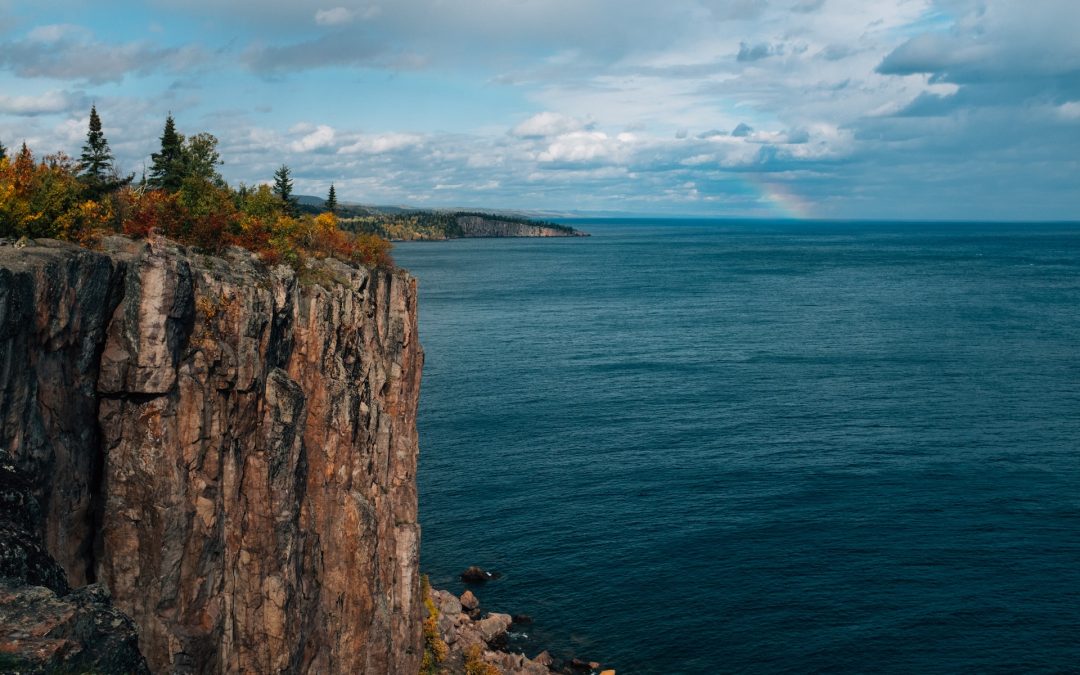

![Kangaroo Walks and Talks [Event Alert]](https://dgrnewsservice.org/wp-content/uploads/sites/18/2023/05/suzuha-kozuki-expMk3K5v_c-unsplash-1080x675.jpg)
